Chenjia Bai
TextOp: Real-time Interactive Text-Driven Humanoid Robot Motion Generation and Control
Feb 07, 2026Abstract:Recent advances in humanoid whole-body motion tracking have enabled the execution of diverse and highly coordinated motions on real hardware. However, existing controllers are commonly driven either by predefined motion trajectories, which offer limited flexibility when user intent changes, or by continuous human teleoperation, which requires constant human involvement and limits autonomy. This work addresses the problem of how to drive a universal humanoid controller in a real-time and interactive manner. We present TextOp, a real-time text-driven humanoid motion generation and control framework that supports streaming language commands and on-the-fly instruction modification during execution. TextOp adopts a two-level architecture in which a high-level autoregressive motion diffusion model continuously generates short-horizon kinematic trajectories conditioned on the current text input, while a low-level motion tracking policy executes these trajectories on a physical humanoid robot. By bridging interactive motion generation with robust whole-body control, TextOp unlocks free-form intent expression and enables smooth transitions across multiple challenging behaviors such as dancing and jumping, within a single continuous motion execution. Extensive real-robot experiments and offline evaluations demonstrate instant responsiveness, smooth whole-body motion, and precise control. The project page and the open-source code are available at https://text-op.github.io/
Learning Soccer Skills for Humanoid Robots: A Progressive Perception-Action Framework
Feb 05, 2026Abstract:Soccer presents a significant challenge for humanoid robots, demanding tightly integrated perception-action capabilities for tasks like perception-guided kicking and whole-body balance control. Existing approaches suffer from inter-module instability in modular pipelines or conflicting training objectives in end-to-end frameworks. We propose Perception-Action integrated Decision-making (PAiD), a progressive architecture that decomposes soccer skill acquisition into three stages: motion-skill acquisition via human motion tracking, lightweight perception-action integration for positional generalization, and physics-aware sim-to-real transfer. This staged decomposition establishes stable foundational skills, avoids reward conflicts during perception integration, and minimizes sim-to-real gaps. Experiments on the Unitree G1 demonstrate high-fidelity human-like kicking with robust performance under diverse conditions-including static or rolling balls, various positions, and disturbances-while maintaining consistent execution across indoor and outdoor scenarios. Our divide-and-conquer strategy advances robust humanoid soccer capabilities and offers a scalable framework for complex embodied skill acquisition. The project page is available at https://soccer-humanoid.github.io/.
HUSKY: Humanoid Skateboarding System via Physics-Aware Whole-Body Control
Feb 03, 2026Abstract:While current humanoid whole-body control frameworks predominantly rely on the static environment assumptions, addressing tasks characterized by high dynamism and complex interactions presents a formidable challenge. In this paper, we address humanoid skateboarding, a highly challenging task requiring stable dynamic maneuvering on an underactuated wheeled platform. This integrated system is governed by non-holonomic constraints and tightly coupled human-object interactions. Successfully executing this task requires simultaneous mastery of hybrid contact dynamics and robust balance control on a mechanically coupled, dynamically unstable skateboard. To overcome the aforementioned challenges, we propose HUSKY, a learning-based framework that integrates humanoid-skateboard system modeling and physics-aware whole-body control. We first model the coupling relationship between board tilt and truck steering angles, enabling a principled analysis of system dynamics. Building upon this, HUSKY leverages Adversarial Motion Priors (AMP) to learn human-like pushing motions and employs a physics-guided, heading-oriented strategy for lean-to-steer behaviors. Moreover, a trajectory-guided mechanism ensures smooth and stable transitions between pushing and steering. Experimental results on the Unitree G1 humanoid platform demonstrate that our framework enables stable and agile maneuvering on skateboards in real-world scenarios. The project page is available on https://husky-humanoid.github.io/.
Towards Adaptive Humanoid Control via Multi-Behavior Distillation and Reinforced Fine-Tuning
Nov 11, 2025Abstract:Humanoid robots are promising to learn a diverse set of human-like locomotion behaviors, including standing up, walking, running, and jumping. However, existing methods predominantly require training independent policies for each skill, yielding behavior-specific controllers that exhibit limited generalization and brittle performance when deployed on irregular terrains and in diverse situations. To address this challenge, we propose Adaptive Humanoid Control (AHC) that adopts a two-stage framework to learn an adaptive humanoid locomotion controller across different skills and terrains. Specifically, we first train several primary locomotion policies and perform a multi-behavior distillation process to obtain a basic multi-behavior controller, facilitating adaptive behavior switching based on the environment. Then, we perform reinforced fine-tuning by collecting online feedback in performing adaptive behaviors on more diverse terrains, enhancing terrain adaptability for the controller. We conduct experiments in both simulation and real-world experiments in Unitree G1 robots. The results show that our method exhibits strong adaptability across various situations and terrains. Project website: https://ahc-humanoid.github.io.
Towards Reliable LLM-based Robot Planning via Combined Uncertainty Estimation
Oct 09, 2025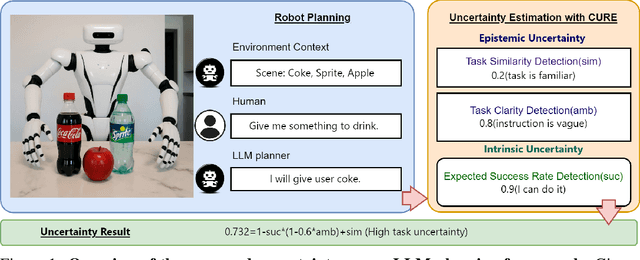
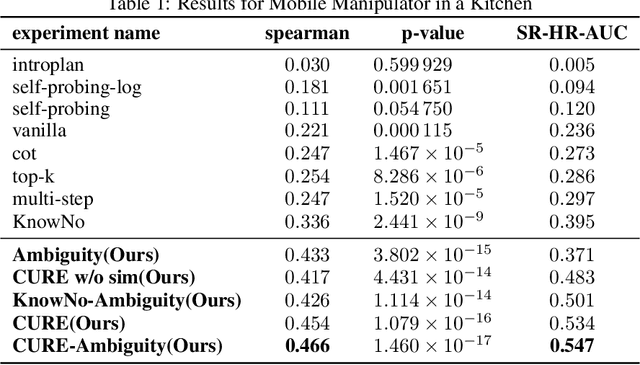
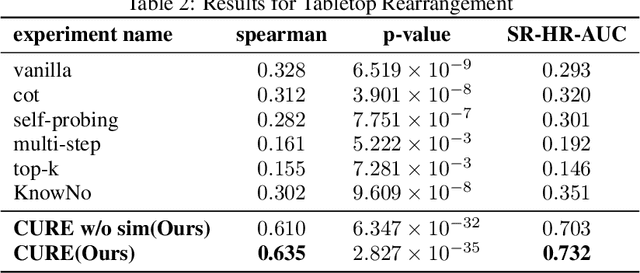
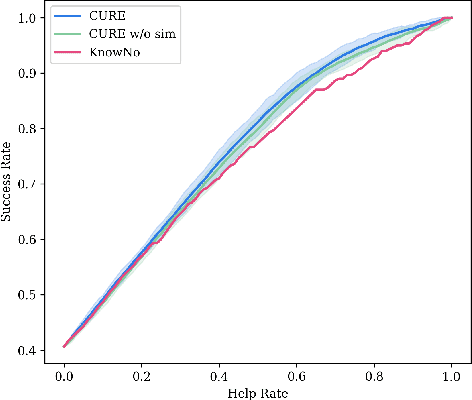
Abstract:Large language models (LLMs) demonstrate advanced reasoning abilities, enabling robots to understand natural language instructions and generate high-level plans with appropriate grounding. However, LLM hallucinations present a significant challenge, often leading to overconfident yet potentially misaligned or unsafe plans. While researchers have explored uncertainty estimation to improve the reliability of LLM-based planning, existing studies have not sufficiently differentiated between epistemic and intrinsic uncertainty, limiting the effectiveness of uncertainty esti- mation. In this paper, we present Combined Uncertainty estimation for Reliable Embodied planning (CURE), which decomposes the uncertainty into epistemic and intrinsic uncertainty, each estimated separately. Furthermore, epistemic uncertainty is subdivided into task clarity and task familiarity for more accurate evaluation. The overall uncertainty assessments are obtained using random network distillation and multi-layer perceptron regression heads driven by LLM features. We validated our approach in two distinct experimental settings: kitchen manipulation and tabletop rearrangement experiments. The results show that, compared to existing methods, our approach yields uncertainty estimates that are more closely aligned with the actual execution outcomes.
HumanoidGen: Data Generation for Bimanual Dexterous Manipulation via LLM Reasoning
Jul 01, 2025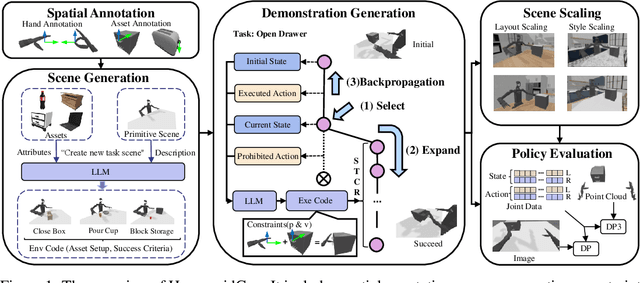
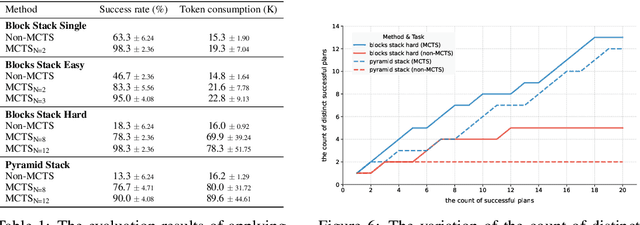

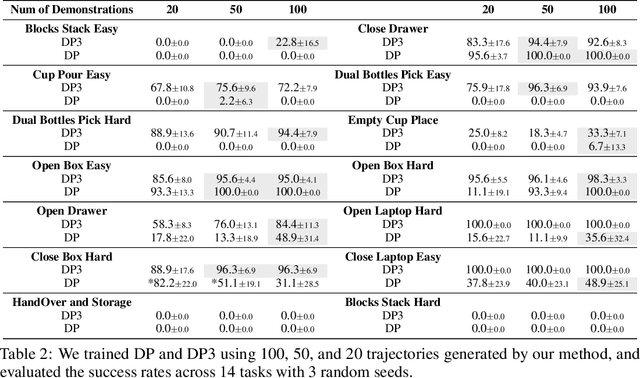
Abstract:For robotic manipulation, existing robotics datasets and simulation benchmarks predominantly cater to robot-arm platforms. However, for humanoid robots equipped with dual arms and dexterous hands, simulation tasks and high-quality demonstrations are notably lacking. Bimanual dexterous manipulation is inherently more complex, as it requires coordinated arm movements and hand operations, making autonomous data collection challenging. This paper presents HumanoidGen, an automated task creation and demonstration collection framework that leverages atomic dexterous operations and LLM reasoning to generate relational constraints. Specifically, we provide spatial annotations for both assets and dexterous hands based on the atomic operations, and perform an LLM planner to generate a chain of actionable spatial constraints for arm movements based on object affordances and scenes. To further improve planning ability, we employ a variant of Monte Carlo tree search to enhance LLM reasoning for long-horizon tasks and insufficient annotation. In experiments, we create a novel benchmark with augmented scenarios to evaluate the quality of the collected data. The results show that the performance of the 2D and 3D diffusion policies can scale with the generated dataset. Project page is https://openhumanoidgen.github.io.
Unsupervised Skill Discovery through Skill Regions Differentiation
Jun 17, 2025
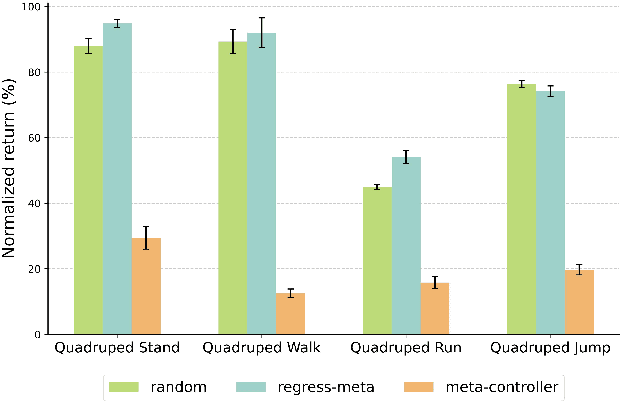
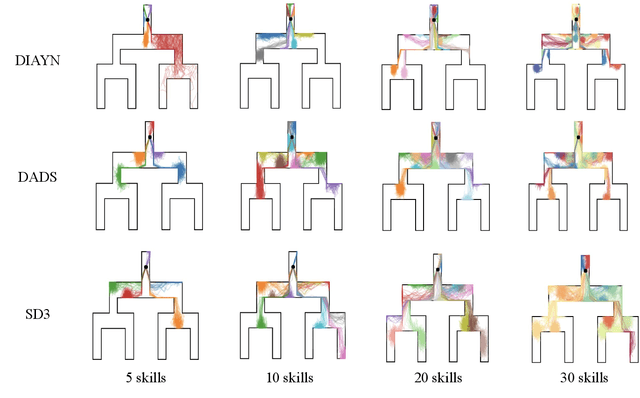
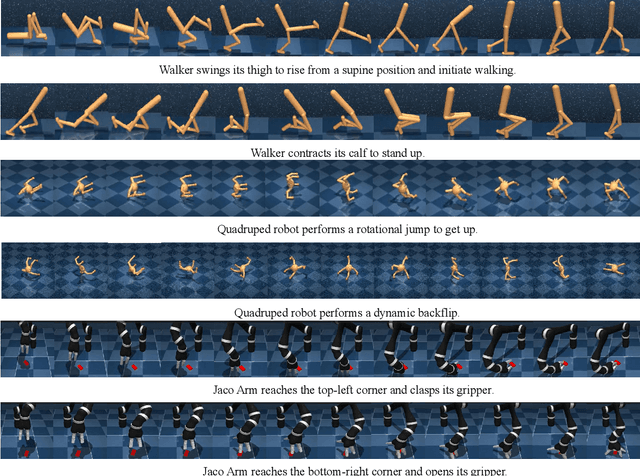
Abstract:Unsupervised Reinforcement Learning (RL) aims to discover diverse behaviors that can accelerate the learning of downstream tasks. Previous methods typically focus on entropy-based exploration or empowerment-driven skill learning. However, entropy-based exploration struggles in large-scale state spaces (e.g., images), and empowerment-based methods with Mutual Information (MI) estimations have limitations in state exploration. To address these challenges, we propose a novel skill discovery objective that maximizes the deviation of the state density of one skill from the explored regions of other skills, encouraging inter-skill state diversity similar to the initial MI objective. For state-density estimation, we construct a novel conditional autoencoder with soft modularization for different skill policies in high-dimensional space. Meanwhile, to incentivize intra-skill exploration, we formulate an intrinsic reward based on the learned autoencoder that resembles count-based exploration in a compact latent space. Through extensive experiments in challenging state and image-based tasks, we find our method learns meaningful skills and achieves superior performance in various downstream tasks.
KungfuBot: Physics-Based Humanoid Whole-Body Control for Learning Highly-Dynamic Skills
Jun 15, 2025Abstract:Humanoid robots are promising to acquire various skills by imitating human behaviors. However, existing algorithms are only capable of tracking smooth, low-speed human motions, even with delicate reward and curriculum design. This paper presents a physics-based humanoid control framework, aiming to master highly-dynamic human behaviors such as Kungfu and dancing through multi-steps motion processing and adaptive motion tracking. For motion processing, we design a pipeline to extract, filter out, correct, and retarget motions, while ensuring compliance with physical constraints to the maximum extent. For motion imitation, we formulate a bi-level optimization problem to dynamically adjust the tracking accuracy tolerance based on the current tracking error, creating an adaptive curriculum mechanism. We further construct an asymmetric actor-critic framework for policy training. In experiments, we train whole-body control policies to imitate a set of highly-dynamic motions. Our method achieves significantly lower tracking errors than existing approaches and is successfully deployed on the Unitree G1 robot, demonstrating stable and expressive behaviors. The project page is https://kungfu-bot.github.io.
MoRE: Mixture of Residual Experts for Humanoid Lifelike Gaits Learning on Complex Terrains
Jun 12, 2025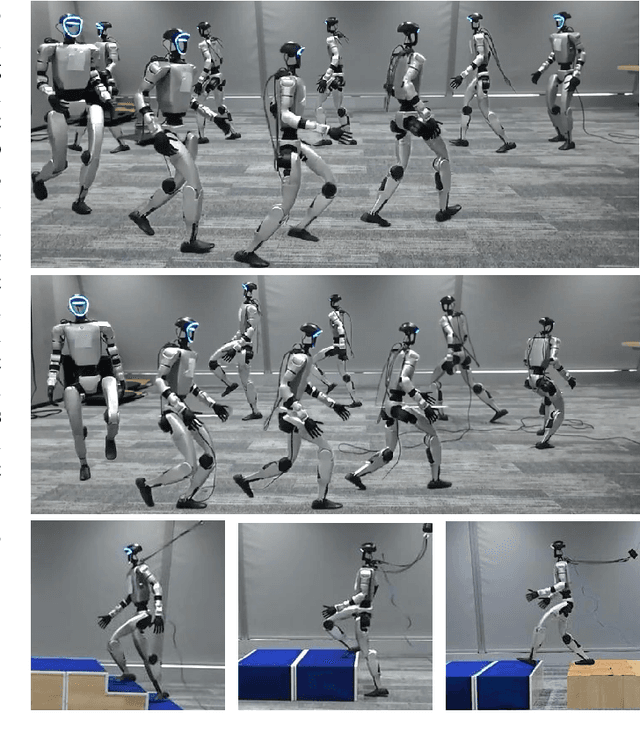
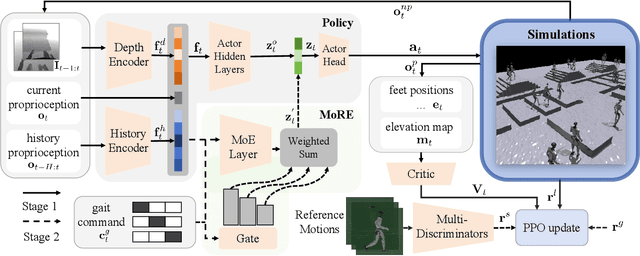
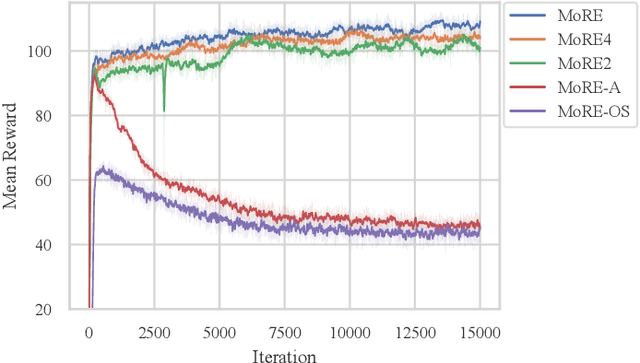
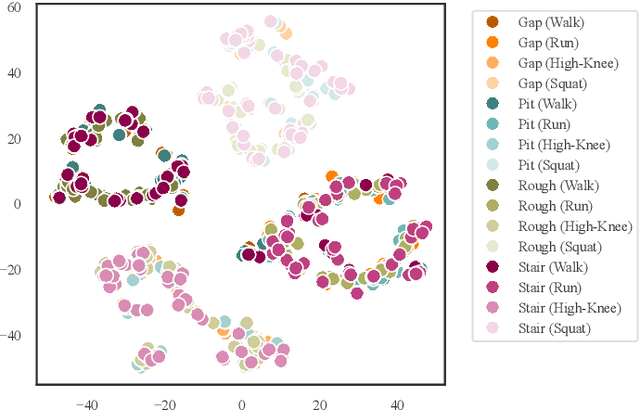
Abstract:Humanoid robots have demonstrated robust locomotion capabilities using Reinforcement Learning (RL)-based approaches. Further, to obtain human-like behaviors, existing methods integrate human motion-tracking or motion prior in the RL framework. However, these methods are limited in flat terrains with proprioception only, restricting their abilities to traverse challenging terrains with human-like gaits. In this work, we propose a novel framework using a mixture of latent residual experts with multi-discriminators to train an RL policy, which is capable of traversing complex terrains in controllable lifelike gaits with exteroception. Our two-stage training pipeline first teaches the policy to traverse complex terrains using a depth camera, and then enables gait-commanded switching between human-like gait patterns. We also design gait rewards to adjust human-like behaviors like robot base height. Simulation and real-world experiments demonstrate that our framework exhibits exceptional performance in traversing complex terrains, and achieves seamless transitions between multiple human-like gait patterns.
Learn as Individuals, Evolve as a Team: Multi-agent LLMs Adaptation in Embodied Environments
Jun 08, 2025



Abstract:Large language models (LLMs) possess extensive knowledge bases and strong reasoning capabilities, making them promising tools for complex, multi-agent planning in embodied environments. However, despite LLMs' advanced abilities and the sophisticated modular design of agentic methods, existing LLM-based planning algorithms remain limited by weak adaptation capabilities to multi-agent embodied scenarios. We address this limitation by introducing a framework that enables LLM agents to learn and evolve both before and during test time, equipping them with environment-relevant knowledge for better planning and enhanced communication for improved cooperation. Inspired by centralized training with decentralized execution in multi-agent reinforcement learning, we propose a \textit{Learn as Individuals, Evolve as a Team (LIET)} paradigm for multi-agent LLMs adaptation. At the individual level, LLM agents learn a local utility function from exploratory datasets to better comprehend the embodied environment, which is then queried during test time to support informed decision-making. At the team level, LLM agents collaboratively and iteratively maintain and update a shared cooperation knowledge list based on new experiences, using it to guide more effective communication. By combining individual learning with team evolution, LIET enables comprehensive and flexible adaptation for LLM agents. Our experiments on Communicative Watch-And-Help and ThreeD-World Multi-Agent Transport benchmarks demonstrate that LIET, instantiated with both LLaMA and GPT-4o, outperforms existing baselines and exhibits strong cooperative planning abilities.
 Add to Chrome
Add to Chrome Add to Firefox
Add to Firefox Add to Edge
Add to Edge